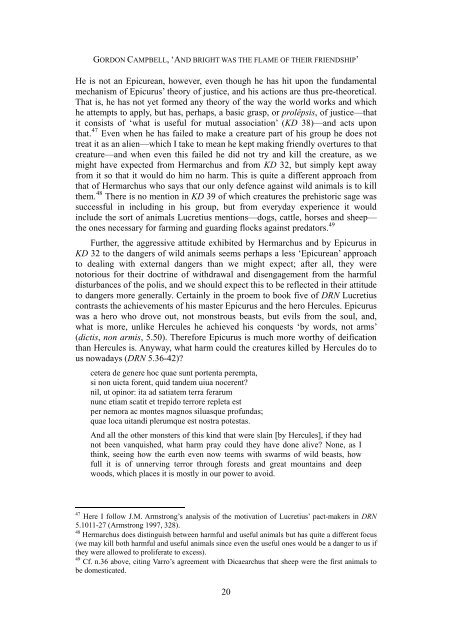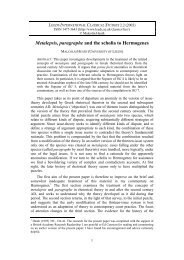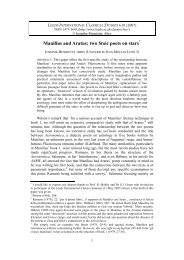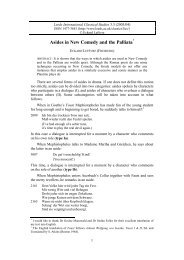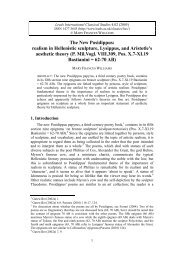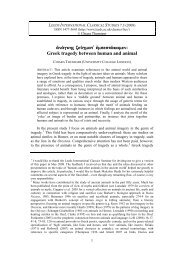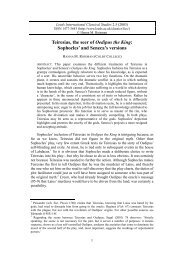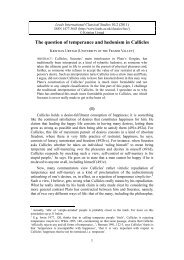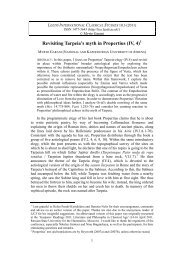'And bright was the flame of their friendship' - Leeds International ...
'And bright was the flame of their friendship' - Leeds International ...
'And bright was the flame of their friendship' - Leeds International ...
Create successful ePaper yourself
Turn your PDF publications into a flip-book with our unique Google optimized e-Paper software.
GORDON CAMPBELL, ‘AND BRIGHT WAS THE FLAME OF THEIR FRIENDSHIP’<br />
He is not an Epicurean, however, even though he has hit upon <strong>the</strong> fundamental<br />
mechanism <strong>of</strong> Epicurus’ <strong>the</strong>ory <strong>of</strong> justice, and his actions are thus pre-<strong>the</strong>oretical.<br />
That is, he has not yet formed any <strong>the</strong>ory <strong>of</strong> <strong>the</strong> way <strong>the</strong> world works and which<br />
he attempts to apply, but has, perhaps, a basic grasp, or prolêpsis, <strong>of</strong> justice—that<br />
it consists <strong>of</strong> ‘what is useful for mutual association’ (KD 38)—and acts upon<br />
that. 47 Even when he has failed to make a creature part <strong>of</strong> his group he does not<br />
treat it as an alien—which I take to mean he kept making friendly overtures to that<br />
creature—and when even this failed he did not try and kill <strong>the</strong> creature, as we<br />
might have expected from Hermarchus and from KD 32, but simply kept away<br />
from it so that it would do him no harm. This is quite a different approach from<br />
that <strong>of</strong> Hermarchus who says that our only defence against wild animals is to kill<br />
<strong>the</strong>m. 48 There is no mention in KD 39 <strong>of</strong> which creatures <strong>the</strong> prehistoric sage <strong>was</strong><br />
successful in including in his group, but from everyday experience it would<br />
include <strong>the</strong> sort <strong>of</strong> animals Lucretius mentions—dogs, cattle, horses and sheep—<br />
<strong>the</strong> ones necessary for farming and guarding flocks against predators. 49<br />
Fur<strong>the</strong>r, <strong>the</strong> aggressive attitude exhibited by Hermarchus and by Epicurus in<br />
KD 32 to <strong>the</strong> dangers <strong>of</strong> wild animals seems perhaps a less ‘Epicurean’ approach<br />
to dealing with external dangers than we might expect; after all, <strong>the</strong>y were<br />
notorious for <strong>the</strong>ir doctrine <strong>of</strong> withdrawal and disengagement from <strong>the</strong> harmful<br />
disturbances <strong>of</strong> <strong>the</strong> polis, and we should expect this to be reflected in <strong>the</strong>ir attitude<br />
to dangers more generally. Certainly in <strong>the</strong> proem to book five <strong>of</strong> DRN Lucretius<br />
contrasts <strong>the</strong> achievements <strong>of</strong> his master Epicurus and <strong>the</strong> hero Hercules. Epicurus<br />
<strong>was</strong> a hero who drove out, not monstrous beasts, but evils from <strong>the</strong> soul, and,<br />
what is more, unlike Hercules he achieved his conquests ‘by words, not arms’<br />
(dictis, non armis, 5.50). Therefore Epicurus is much more worthy <strong>of</strong> deification<br />
than Hercules is. Anyway, what harm could <strong>the</strong> creatures killed by Hercules do to<br />
us nowadays (DRN 5.36-42)?<br />
cetera de genere hoc quae sunt portenta perempta,<br />
si non uicta forent, quid tandem uiua nocerent?<br />
nil, ut opinor: ita ad satiatem terra ferarum<br />
nunc etiam scatit et trepido terrore repleta est<br />
per nemora ac montes magnos siluasque pr<strong>of</strong>undas;<br />
quae loca uitandi plerumque est nostra potestas.<br />
And all <strong>the</strong> o<strong>the</strong>r monsters <strong>of</strong> this kind that were slain [by Hercules], if <strong>the</strong>y had<br />
not been vanquished, what harm pray could <strong>the</strong>y have done alive? None, as I<br />
think, seeing how <strong>the</strong> earth even now teems with swarms <strong>of</strong> wild beasts, how<br />
full it is <strong>of</strong> unnerving terror through forests and great mountains and deep<br />
woods, which places it is mostly in our power to avoid.<br />
47<br />
Here I follow J.M. Armstrong’s analysis <strong>of</strong> <strong>the</strong> motivation <strong>of</strong> Lucretius’ pact-makers in DRN<br />
5.1011-27 (Armstrong 1997, 328).<br />
48<br />
Hermarchus does distinguish between harmful and useful animals but has quite a different focus<br />
(we may kill both harmful and useful animals since even <strong>the</strong> useful ones would be a danger to us if<br />
<strong>the</strong>y were allowed to proliferate to excess).<br />
49<br />
Cf. n.36 above, citing Varro’s agreement with Dicaearchus that sheep were <strong>the</strong> first animals to<br />
be domesticated.<br />
20


